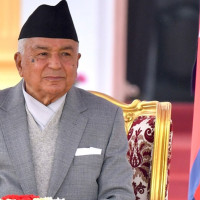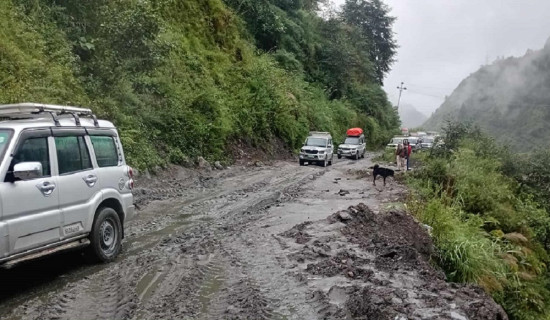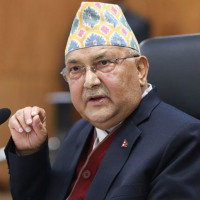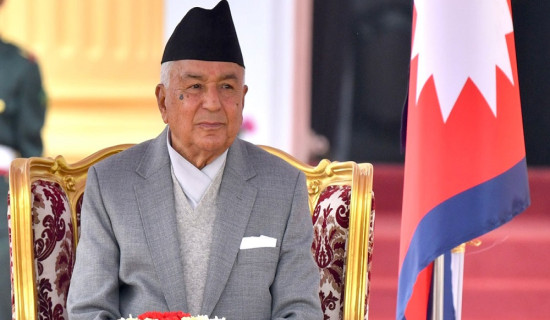- Friday, 30 January 2026
Making TU Research-Centric
Tribhuvan University is the oldest and largest public institution for higher education in Nepal. It has been producing qualified human resources with strong academic credentials and advanced skills. Many of its products have been working in different organisations at home and abroad. Since its establishment in 1959, the country has experienced political transitions from the multi-party system to the partyless Panchayat era, the restoration of the multi-party system in the 1990s, and finally the republican federal democratic system in 2008. Tribhuvan University could not remain aloof from these changes.
Moreover, its students and teachers played important roles in the democratic changes in the country. All of these changes in national life have deep repercussions for the country's higher education system. Over the years, TU has expanded its campuses across the country and upgraded its academic programmes.
Now, TU has 40 central departments, nine departments and programmes, 62 constituent campuses, and 1,058 affiliated colleges in different disciplines under its five institutes and four faculties. The head of government is the Chancellor, who appoints the Vice Chancellor as its executive leader. By now, 18 vice chancellors have already served as the leaders of TU.
Amidst various challenges, such as financial constraints, poor teaching and research infrastructures, political transitions, increasing unionism, and growing public aspiration for quality education, the TU leadership, in their sincere efforts to transform the university into a centre of excellence, has been able to sustain its legacy as the largest public institution for higher education.
TU shares about 80 per cent of the total number of students in higher education in Nepal. Recently, with an increasing level of globalisation, the goal of higher education has also changed from merely providing curriculum-based content to offering ample opportunities for students to enhance their enormous capabilities for research and knowledge production. Researchers and experts can compete with their counterparts in the complex and interconnected modern society not only for the best adaptation but also for acceleration in people's mindsets to rethink humanity and nature.
TU has best realised this goal, and the incumbent Vice-Chancellor, Prof. Dr. Dharma Kanta Baskota, has taken major initiatives to transform TU from a teaching-based to a research-based university, including the 15-point vision of reform and transformation he presented after resuming the responsibility.
Research at TU
TU has recently started providing research opportunities to students and faculties through different research grants. It has revisited its special grants and existing small research grants amounts and eligibility criteria for applications. Importantly, it has started a new research grant scheme, 'the national priority area research (NPAR) grants', which provides large research grants under the four categories.
The national priority areas are decided based on the existing Five-Year Plan of the government, the research needs of the National Planning Commission, different ministries and departments, and the priorities of the university. In addition to NPAR grants, it has also started another new scheme called the Research Endowment Fund.
Until last year, TU used to provide mini-research grants of Rs. 50,000 to its faculty. About 100 faculties benefit each year. This grant has been upgraded to the Small Research Grants, and the amount has increased to Rs. 200,000. With its mandatory provision of peer-reviewed publication, 30 faculty researchers secured grants in FY 2079/80. Similarly, under the newly opened Research Endowment Fund, research grants of Rs. 250,000 have been awarded to five teams of faculty and students. In addition, fellowships to Masters (Rs. 50,000), MPhil (Rs. 75,000), and PhD (Rs. 300,000) researchers have also been awarded.
The provision of the National Priority Area Research Grants, known as 'NPAR grants', is a ground-breaking achievement in the history of Tribhuvan University. Under this scheme, there are four categories of grants: Emerging Faculty Research Grant (EFRG), Major Research Grant (MRG), Excellence Research Grant (ERG), and Innovative Research Grant (IRG).
To be offered to early-career researchers to enhance their research capacity, the EFRG, with an amount of Rs. 1,000,000, needs to be completed within two years. Under this scheme, publication of two SCImago/impact factor journal articles along with a final research report is mandatory. A research team with a principal researcher and at least two co-researchers, along with fellowships for master’s and PhD researchers, can be involved in the project. The research must be completed within 2.5 years with the publication of at least 2 SCImago papers, one policy brief paper, and a final research report.
Likewise, ERG, with its amount of Rs. 5,000,000, aims to enhance research quality, competency, and research culture in the respective departments and campuses (Figure 1). It should be completed within three years with the publication of at least two SCImago papers, one policy brief paper, and a final research report. The research team can involve master's, PhD, or Postdoctoral researchers and provide fellowships.
Then, IRG, the largest grant with an amount of Rs. 10, 000,000, aims to encourage innovative research relevant to the development of the country and the prosperity of the people. These grants can go to the existing four research centres of the university:
The Centre for Economic Development and Administration (CEDA), the Centre for Nepal and Asian Studies (CNAS), the Research Centre for Applied Science and Technology (RECAST), and the Research Centre for Educational Innovation and Development (CERID). The research must be completed within three years with the publication of at least three SCImago papers, one policy brief paper, and a research report. Importantly, Masters, PhD, and postdoctoral researchers can be involved and trained in the research.
Grant processing
The TU Research Directorate calls for proposals for the grants at the beginning of the fiscal year. TU faculty can form their research teams and submit their proposals for these offers. It has provisioned an independent research proposal selection committee that selects the international and national experts and sends the eligible proposals for evaluation. The proposals that pass the technical review process are invited to make their oral presentation to the selection committee.
Finally, the grant is awarded based on the total score of both evaluations. The NPAR grants are primarily for the TU faculty. But there can be one co-researcher from outside TU who has been working in other institutions, including universities, government bodies, and research centres. The TU researcher can collaborate with such institutions so that knowledge and facilities can be injected, and a long-term research network can be developed. Many of the research projects under this grant scheme have established such collaborations, using the scientific lab to complete their research.
Way Forward
TU is gradually increasing its research budget. It has made a provision to allocate 5–10 per cent of the budget of its constituent colleges. It has allocated Rs. 410 million for research in the current fiscal year. With a strong lobby and continued efforts of the TU leadership, TU has been receiving Rs. 100 million as block grants from the government through the University Grants Commission, Nepal, since FY 2077/78. The NPAR research grants are managed by this grant committee. The other research grants under the scheme of small research grants and the research endowment fund are managed from TU's own resources.
Since the beginning of NPAR grants in FY 2077/78, it has already funded 57 research proposals under various themes, such as heart disease, eye disease, forest fire and biodiversity, invasive species, tourism, sustainable urban development, land abandonment, air pollution, mid-day meal, and integrated curriculum (Figure 2), and about 170 proposals under the mini and small research grants.
Earlier, TU used to offer limited research opportunities. The first ever national institution, with its large student population, was basically a teaching-based government university. But it has recently increased its focus to make TU a research-based university. In this light, the Vice-Chancellor at one point remarked that TU needs to create its impact in society.
TU must create policy impact through evidence-based research. In addition, it must develop a research culture and research-based human resources in the country. The initiation of the NPAR grants, according to Vice Chancellor Prof. Baskota, must focus on this goal. However, TU must capacitate its faculty to enhance their research competency while enticing students to direct themselves towards research and publication. Government research funding is scarce and must be made available in order to fund research-based higher education and support the development of evidence-based public policy in the nation.
(The author is a Professor of Geography at the Tribhuvan University.)




-square-thumb.jpg)




-original-thumb.jpg)

-original-thumb.jpg)
-original-thumb.jpg)


